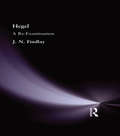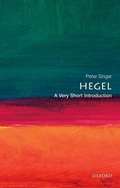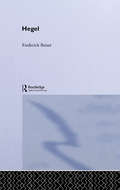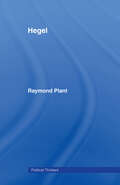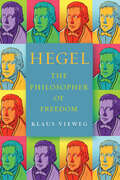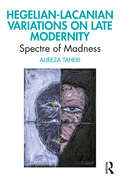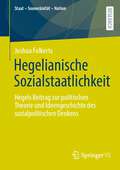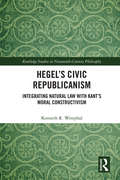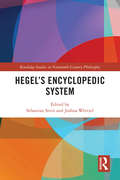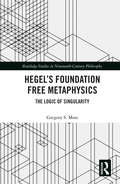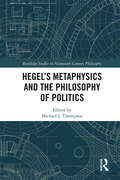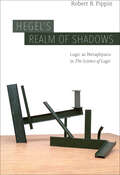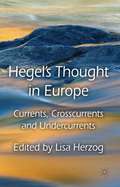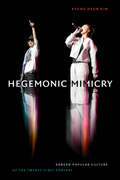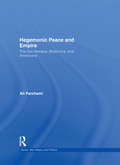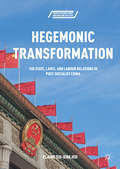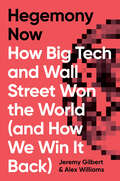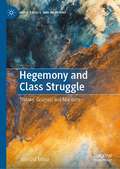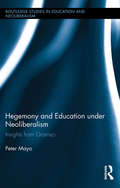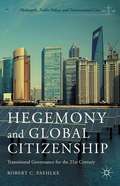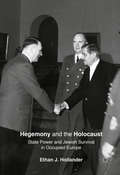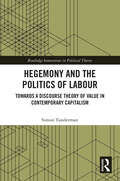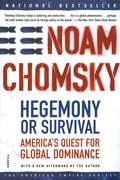- Table View
- List View
Hegel: A Re-Examination (Muirhead Library Of Philosophy Ser.)
by Findlay, J NFirst published in 2002. Routledge is an imprint of Taylor & Francis, an informa company.
Hegel: A Very Short Introduction
by Peter SingerHegel is regarded as one of the most influential figures on modern political and intellectual development. After painting Hegel's life and times in broad strokes, Peter Singer goes on to tackle some of the more challenging aspects of Hegel's philosophy. Offering a broad discussion of Hegel's ideas and an account of his major works, Singer explains what have often been considered abstruse and obscure ideas in a clear and inviting manner.
Hegel: German Philosophy, 1840-1900 (The Routledge Philosophers)
by Frederick BeiserHegel (1770-1831) is one of the major philosophers of the nineteenth century. Many of the major philosophical movements of the twentieth century - from existentialism to analytic philosophy - grew out of reactions against Hegel. He is also one of the hardest philosophers to understand and his complex ideas, though rewarding, are often misunderstood. In this magisterial and lucid introduction, Frederick Beiser covers every major aspect of Hegel's thought. He places Hegel in the historical context of nineteenth-century Germany whilst clarifying the deep insights and originality of Hegel's philosophy.A masterpiece of clarity and scholarship, Hegel is both the ideal starting point for those coming to Hegel for the first time and essential reading for any student or scholar of nineteenth century philosophy.Additional features: glossary chapter summaries chronology annotated further reading.
Hegel: The Great Philosophers (The\great Philosophers Ser. #8)
by Raymond PlantFirst published in 1973 this volume demonstrates the interconnection between Hegel's political and metaphysical writings. This book provides a point of entry into Hegel's system of ideas. Condemned unread, and when read far too often misunderstood, Hegel's thought has once more begun to make its impact on contemporary ideas with many of today's most important social and political thinkers.
Hegel: The Philosopher of Freedom
by Klaus ViewegA monumental new biography of a pivotal yet poorly understood pioneer in modern philosophy. When a painter once told Goethe that he wanted to paint the most celebrated man of the age, Goethe directed him to Georg Wilhelm Friedrich Hegel. Hegel worked from the credo: To philosophize is to learn to live freely. While he was slow and cautious in the development of his philosophy, his intellectual growth was like an odyssey of the mind, and, contrary to popular belief, his life was full of twists and turns, suspense and even danger. In this landmark biography, the philosopher Klaus Vieweg paints a new picture of the life and work of the most important representative of German idealism. His vivid portrait provides readers an intimate account of Hegel's times and the milieu in which he developed his thought, along with detailed, clear-sighted analyses of Hegel's four major works. What results is a new interpretation of Hegel through the lens of reason and freedom. Vieweg draws on extensive archival research that has brought to light a wealth of hitherto undiscovered documents and handwritten notes relating to Hegel's work, touching on Hegel's engagement with the leading thinkers and writers of his age: Kant, Fichte, Schelling, Hölderlin, and others. Combatting clichés and misunderstandings about Hegel, Vieweg also offers a sustained defense of the philosopher's more progressive impulses. Highly praised upon its release in Germany as having set the new biographical standard, this monumental work emphasizes Hegel's relevance for today, depicting him as a vital figure in the history of philosophy.
Hegelian-Lacanian Variations on Late Modernity: Spectre of Madness
by Alireza TaheriThe current rise in new religions and the growing popularity of New Ageism is concomitant with an increasingly anti-philosophical sentiment marking our contemporary situation. More specifically, it is philosophical and psychoanalytic reason that has lost standing faced with the triumph of post-secular "spirituality". Combatting this trend, this treatise develops a theoretical apparatus based on Hegelian speculative reason and Lacanian psychoanalysis. With the aid of this theoretical apparatus, the book argues how certain conceptual pairs appear opposed through an operation of misrecognition christened, following Hegel, as "diremption". The failure to reckon with identities-in-difference relegates the subject to more vicious contradictions that define central aspects of our contemporary predicament. The repeated thesis of the treatise is that the deadlocks marking our contemporary situation require renewed engagement with dialectical thinking beyond the impasses of common understanding. Only by embarking on this philosophical-psychoanalytic "path of despair" (Hegel) will we stand a chance of achieving "joyful wisdom" (Nietzsche). Developing a unique dialectical theory based on readings of Hegel, Lacan and Žižek, in order to address various philosophical and psychoanalytic questions, this book will be of great interest to anyone interested in German idealism and/or psychoanalytic theory.
Hegelianische Sozialstaatlichkeit: Hegels Beitrag zur politischen Theorie und Ideengeschichte des sozialpolitischen Denkens (Staat – Souveränität – Nation)
by Joshua FolkertsIn diesem Buch wird erstens Hegels ideengeschichtlicher Beitrag zur Genese von Sozialstaatstheorien herausgearbeitet und zweitens seine politische Theorie für die politiktheoretische Modellierung von Sozialstaatlichkeit fruchtbar gemacht. Mit Hegel lässt sich ein Mittelweg zwischen vor allem ökonomisch orientierter Sozialpolitik und vor allem anerkennungsfokussierter Identitätspolitik einschlagen, der weder mangelnde Anerkennung nur als Epiphänomen ökonomischer Verhältnisse versteht noch freiheitsbeschränkende Armut durch die Einforderung von Respekt für prekäre Lebenslagen normalisiert. Im genuin modernen Konflikt des Auseinandertretens von Gesellschaft und Staat, von sich selbst verwirklichendem Individuum auf dem Markt und der Gemeinschaft, zeichnet sich eine neue zentrale Funktion des Staats ab: Die Garantie der Freiheit für seine Bürger. Der Sozialstaat als Mittel dieser staatlichen Freiheitsgarantie erfüllt somit nicht nur eine bedeutende Rolle in der Versöhnung von Individuum und Gemeinschaft, sondern bildet hierdurch zugleich ein zentrales Legitimationselement des modernen Staats.
Hegel’s Civic Republicanism: Integrating Natural Law with Kant’s Moral Constructivism (Routledge Studies in Nineteenth-Century Philosophy)
by Kenneth R. WestphalIn this book, Westphal offers an original interpretation of Hegel’s moral philosophy. Building on his previous study of the role of natural law in Hume’s and Kant’s accounts of justice, Westphal argues that Hegel developed and justified a robust form of civic republicanism. Westphal identifies, for the first time, the proper genre to which Hegel’s Philosophical Outlines of Justice belongs and to which it so prodigiously contributes, which he calls Natural Law Constructivism, an approach developed by Hume, Rousseau, Kant, and Hegel. He brings to bear Hegel’s adoption and augmentation of Kant’s Critique of rational judgment and justification in all non-formal domains to his moral philosophy in his Outlines. Westphal argues that Hegel’s justification for the standards of political legitimacy successfully integrates Rousseau’s Independence Requirement into the role of public reason within a constitutional republic. In these regards, Hegel’s moral and political principles are progressive not only in principle, but also in practice. Hegel’s Civic Republicanism will be of interest to scholars of moral philosophy, social and political philosophy, Hegel, eighteenth- and nineteenth-century philosophy.
Hegel’s Encyclopedic System (Routledge Studies in Nineteenth-Century Philosophy)
by Sebastian Stein and Joshua WretzelThis book discusses the most comprehensive of Hegel’s works: his long-neglected Encyclopedia of the Philosophical Sciences in Outline. It contains original essays by internationally renowned and emerging voices in Hegel scholarship. Their contributions elucidate fundamental aspects of Hegel’s encyclopedic system with an eye to its contemporary relevance. The book thus addresses system-level claims about Hegel’s unique conceptions of philosophy, philosophical "science" and its method, dialectic, speculative thinking, and the way they relate to both Hegelian and contemporary notions of nature, history, religion, freedom, and cultural praxis.
Hegel’s Foundation Free Metaphysics: The Logic of Singularity (Routledge Studies in Nineteenth-Century Philosophy)
by Gregory S. MossContemporary philosophical discourse has deeply problematized the possibility of absolute existence. Hegel’s Foundation Free Metaphysics demonstrates that by reading Hegel’s Doctrine of the Concept in his Science of Logic as a form of Absolute Dialetheism, Hegel’s logic of the concept can account for the possibility of absolute existence. Through a close examination of Hegel’s concept of self-referential universality in his Science of Logic, Moss demonstrates how Hegel’s concept of singularity is designed to solve a host of metaphysical and epistemic paradoxes central to this problematic. He illustrates how Hegel’s revolutionary account of universality, particularity, and singularity offers solutions to six problems that have plagued the history of Western philosophy: the problem of nihilism, the problem of instantiation, the problem of the missing difference, the problem of absolute empiricism, the problem of onto-theology, and the third man regress. Moss shows that Hegel’s affirmation and development of a revised ontological argument for God’s existence is designed to establish the necessity of absolute existence. By adopting a metaphysical reading of Richard Dien Winfield’s foundation free epistemology, Moss critically engages dominant readings and contemporary debates in Hegel scholarship. Hegel’s Foundation Free Metaphysics will appeal to scholars interested in Hegel, German Idealism, 19th- and 20th-century European philosophy, metaphysics, epistemology, and contemporary European thought.
Hegel’s Foundation Free Metaphysics: The Logic of Singularity (Routledge Studies in Nineteenth-Century Philosophy)
by Gregory S. MossWinner of the hegelpd–prize 2022Contemporary philosophical discourse has deeply problematized the possibility of absolute existence. Hegel’s Foundation Free Metaphysics demonstrates that by reading Hegel’s Doctrine of the Concept in his Science of Logic as a form of Absolute Dialetheism, Hegel’s logic of the concept can account for the possibility of absolute existence. Through a close examination of Hegel’s concept of self-referential universality in his Science of Logic, Moss demonstrates how Hegel’s concept of singularity is designed to solve a host of metaphysical and epistemic paradoxes central to this problematic. He illustrates how Hegel’s revolutionary account of universality, particularity, and singularity offers solutions to six problems that have plagued the history of Western philosophy: the problem of nihilism, the problem of instantiation, the problem of the missing difference, the problem of absolute empiricism, the problem of onto-theology, and the third man regress. Moss shows that Hegel’s affirmation and development of a revised ontological argument for God’s existence is designed to establish the necessity of absolute existence. By adopting a metaphysical reading of Richard Dien Winfield’s foundation free epistemology, Moss critically engages dominant readings and contemporary debates in Hegel scholarship. Hegel’s Foundation Free Metaphysics will appeal to scholars interested in Hegel, German Idealism, 19th- and 20th-century European philosophy, metaphysics, epistemology, and contemporary European thought.
Hegel’s Metaphysics and the Philosophy of Politics (Routledge Studies in Nineteenth-Century Philosophy)
by Michael J. ThompsonThe renaissance in Hegel scholarship over the past two decades has largely ignored or marginalized the metaphysical dimension of his thought, perhaps most vigorously when considering his social and political philosophy. Many scholars have consistently maintained that Hegel’s political philosophy must be reconstructed without the metaphysical structure that Hegel saw as his crowning philosophical achievement. This book brings together twelve original essays that explore the relation between Hegel’s metaphysics and his political, social, and practical philosophy. The essays seek to explore what normative insights and positions can be obtained from examining Hegel’s distinctive view of the metaphysical dimensions of political philosophy. His ideas about the good, the universal, freedom, rationality, objectivity, self-determination, and self-development can be seen in a new context and with renewed understanding once their relation to his metaphysical project is considered. Hegel’s Metaphysics and the Philosophy of Politics will be of great interest to scholars of Hegelian philosophy, German Idealism, nineteenth-century philosophy, political philosophy, and political theory.
Hegel’s Realm of Shadows: Logic as Metaphysics in “The Science of Logic”
by Robert B. PippinHegel frequently claimed that the heart of his entire system was a book widely regarded as among the most difficult in the history of philosophy, The Science of Logic. This is the book that presents his metaphysics, an enterprise that he insists can only be properly understood as a “logic,” or a “science of pure thinking.” Since he also wrote that the proper object of any such logic is pure thinking itself, it has always been unclear in just what sense such a science could be a “metaphysics.” Robert B. Pippin offers here a bold, original interpretation of Hegel’s claim that only now, after Kant’s critical breakthrough in philosophy, can we understand how logic can be a metaphysics. Pippin addresses Hegel’s deep, constant reliance on Aristotle’s conception of metaphysics, the difference between Hegel’s project and modern rationalist metaphysics, and the links between the “logic as metaphysics” claim and modern developments in the philosophy of logic. Pippin goes on to explore many other facets of Hegel’s thought, including the significance for a philosophical logic of the self-conscious character of thought, the dynamism of reason in Kant and Hegel, life as a logical category, and what Hegel might mean by the unity of the idea of the true and the idea of the good in the “Absolute Idea.” The culmination of Pippin’s work on Hegel and German idealism, no Hegel scholar or historian of philosophy will want to miss this book.
Hegel’s Thought in Europe
by Lisa HerzogIn a broad interdisciplinary perspective, established experts and leading young scholars bring together important currents of Hegelianism in Europe from the 19th to the 21st century to trace the political, social and intellectual contexts in which Hegel's philosophy was taken up and inspired very different forms of Hegelianism and Anti-Hegelianism.
Hegel’s World Revolutions
by Richard BourkeA new account of the relevance of Hegel&’s ideas for today&’s world, countering the postwar anti-Hegel "insurgency"G.W.F. Hegel was widely seen as the greatest philosopher of his age. Ever since, his work has shaped debates about issues as varied as religion, aesthetics and metaphysics. His most lasting contribution was his vision of history and politics. In Hegel&’s World Revolutions, Richard Bourke returns to Hegel&’s original arguments, clarifying their true import and illuminating their relevance to contemporary society. Bourke shows that central to Hegel&’s thought was his anatomy of the modern world. On the one hand he claimed that modernity was a deliverance from subjection, but on the other he saw it as having unleashed the spirit of critical reflection. Bourke explores this predicament in terms of a series of world revolutions that Hegel believed had ushered in the rise of civil society and the emergence of the constitutional state.Bourke interprets Hegel&’s thought, with particular reference to his philosophy of history, placing it in the context of his own time. He then recounts the reception of Hegel&’s political ideas, largely over the course of the twentieth century. Countering the postwar revolt against Hegel, Bourke argues that his disparagement by major philosophers has impoverished our approach to history and politics alike. Challenging the condescension of leading thinkers—from Heidegger and Popper to Lévi-Strauss and Foucault—the book revises prevailing views of the relationship between historical ideas and present circumstances.
Hegemonic Mimicry: Korean Popular Culture of the Twenty-First Century
by Kyung Hyun KimIn Hegemonic Mimicry, Kyung Hyun Kim considers the recent global success of Korean popular culture—the Korean wave of pop music, cinema, and television, which is also known as hallyu—from a transnational and transcultural perspective. Using the concept of mimicry to think through hallyu's adaptation of American sensibilities and genres, he shows how the commercialization of Korean popular culture has upended the familiar dynamic of major-to-minor cultural influence, enabling hallyu to become a dominant global cultural phenomenon. At the same time, its worldwide popularity has rendered its Koreanness opaque. Kim argues that Korean cultural subjectivity over the past two decades is one steeped in ethnic rather than national identity. Explaining how South Korea leaped over the linguistic and cultural walls surrounding a supposedly “minor” culture to achieve global ascendance, Kim positions K-pop, Korean cinema and television serials, and even electronics as transformative acts of reappropriation that have created a hegemonic global ethnic identity.
Hegemonic Peace and Empire: The Pax Romana, Britannica and Americana (War, History and Politics)
by Ali ParchamiThis book examines the language and the ideology of the Pax Romana, the Pax Britannica and the Pax Americana within the broader contexts of 'hegemony' and 'empire'. It addresses three main themes: a conceptual examination of the way in which hegemony has been justified; a linguistic study of how the notion of pax (usually translated as peace) has been used in ancient and modern times; and a study of the international orders created by Rome and Britain. Using an historiographical approach, the book draws upon texts from Greco-Roman antiquity, and sources from the nineteenth, twentieth and twenty-first centuries to show how the pax ideology has served as a justification for hegemonic foreign policy, and as an intellectual exercise in power projection. From Tacitus' condemnation of what he described as 'creating a wilderness and calling it peace', to debates about the establishment of a Pax Americana in post-Saddam Hussein's Iraq, the book shows not only how the governing elite in each of the three hegemonic orders prescribed to a loose interpretation of the pax ideology, but also how their internal disagreements and different conceptualisations of pax have affected the process of 'empire-building'. This book will be of interest to students of international history, empire, and International Relations in general.
Hegemonic Transformation: The State, Laws, and Labour Relations in Post-Socialist China (Series in Asian Labor and Welfare Policies)
by Elaine Sio-ieng HuiThis book contends that the Chinese economic reform inaugurated since 1978 has been a top-down passive revolution, in Gramsci’s term, and that after three decades of reform the role of the Chinese state has been changing from steering the passive revolution through coercive tactics to establishing capitalist hegemony. It illustrates that the labour law system is a crucial vehicle through which the Chinese party-state seeks to secure the working class’s consent to the capitalist class’s ethno-political leadership. The labour law system has exercised a double hegemonic effect with regards to the capital-labour relations and state-labour relations through four major mechanisms. However, these effects have influenced the Chinese migrant workers in an uneven manner. The affirmative workers have granted active consent to the ruling class leadership; the indifferent, ambiguous and critical workers have only rendered passive consent while the radical workers has refused to give any consent at all.
Hegemony Now: How Big Tech and Wall Street Won the World (And How We Win it Back)
by Alex Williams Jeremy GilbertHow did we come to live in a world dominated by big tech and finance? Today power is in the hands of Wall Street and Silicon Valley. How do we understand this transformation in power? And what can we do about it? We cannot change anything until we have a better understanding of how power works, who holds it, and why that matters. Through upgrading the concept of hegemony—understanding the importance of passive consent; the complexity of political interests; and the structural force of technology—Jeremy Gilbert and Alex Williams offer us an updated theory of power for the twenty-first century. Hegemony Now explores how these forces came to control our world. The authors show how they have shaped the direction of politics and government as well as the neoliberal economy to benefit their own interests. However, this dominance is under threat. Following the 2008 financial crisis, a new order emerged in which the digital platform is the central new technology of both production and power. This offers new opportunities for counter hegemonic strategies to win back power. Hegemony Now outlines a dynamic socialist strategy for the twenty-first century.
Hegemony and Class Struggle: Trotsky, Gramsci and Marxism (Marx, Engels, and Marxisms)
by Juan Dal MasoLeon Trotsky and Antonio Gramsci are two of the most important Marxist thinkers of the 20th century. This book explores the similarities and the differences between their philosophical and political theories. The first and second chapters deal with a still under-investigated aspect of Trotsky’s thought, i.e. his reflections on the issue of hegemony. The third chapter focuses on Gramsci’s critique of Trotsky in his Prison Notebooks, analysing Gramsci’s knowledge of Trotsky’s positions as well as the scope and limits of Gramsci’s critique. The fourth chapter consists of a critical rereading of Perry Anderson's essay Antinomies of Antonio Gramsci, originally published in 1976 and republished in 2017 and an analysis of the book Gramsci and Trotsky in the Shadow of Stalinism by Emanuele Saccarelli. The result is an investigation that offers new insight into both Trotsky’s and Gramsci’s thought, while proposing a new point of view from which to interpret revolutionary theory and strategy in the contemporary scenario. One of the main topics addressed throughout the three essays is the specific position of the problem of hegemony in a theory of permanent revolution, demonstrating that Trotsky had a particular understanding of the question of hegemony and that Gramsci, in turn, introduced a concept of hegemony that is closely associated with an idea of permanent revolution, such that the dynamics of the relationship between democratic struggles and socialist struggles presented in both theories are very similar.
Hegemony and Education Under Neoliberalism: Insights from Gramsci (Routledge Studies in Education, Neoliberalism, and Marxism #8)
by Peter MayoBased in a holistic exposition and appraisal of Gramsci’s writings that are of relevance to education in neoliberal times, this book--rather than simply applying Gramsci's theories to issues in education--argues that education constitutes the leitmotif of his entire oeuvre and lies at the heart of his conceptualization of the ancient Greek term hegemony that was used by other political theorists before him. Starting from this understanding, the book goes on to compare Gramsci's theories with those of later thinkers in the development of a critical pedagogy that can confront neoliberalism in all its forms.
Hegemony and Global Citizenship
by Robert C. PaehlkeAmericans felt part of 'the greatest nation on earth' and many of the world's citizens, with obvious exceptions, were warily comfortable with America's hegemonic power. That comfort faded dramatically during the Bush administration's rejection of Kyoto and its invasion of Iraq. Many, including many Americans, began to rethink global governance. A more democratic approach to international relations is necessary, especially one that addresses rising inequality worldwide and global financial instability driven by deregulation initiated by national governments. Citizens also demand a collective capacity to protect the natural systems on which we depend and more Americans now ask about the opportunity costs of military spending. Humankind shares a common fate. Accordingly, we need a democratic global capacity to act on common concerns. Rethinking our understanding of citizenship as global rights and obligations as well as national ones is in order, as is active global citizenship as an alternative to hegemony's limits and perils.
Hegemony and the Holocaust
by Ethan J. HollanderThis book explains why more Jewish people survived in some German-occupied countries compared to others during World War II. Hollander demonstrates that collaborators sometimes played a surprising role in ensuring Jewish survival. Where high-ranking governing officials stayed in their countries and helped Nazi Germany, they could often "trade" their loyal cooperation in military and economic affairs for inefficient or incomplete implementation of the Final Solution. And while they sometimes did this because they had sincere moral objections to Nazi policy, they also did so because deporting local Jews was politically unpopular, because they regarded it as less important than winning the war, or because deporting Jews meant that the collaborators gave up potentially profitable opportunities to exploit them. This unique book has important implications for our understanding of state-sponsored violence, international hierarchy, and genocide, and it raises harrowing moral questions about the Holocaust and the nature of political evil.
Hegemony and the Politics of Labour: Towards a Discourse Theory of Value in Contemporary Capitalism (Routledge Innovations in Political Theory)
by Simon TundermanHegemony and the Politics of Labour takes up a question that goes to the heart of the debate about politics, capitalism, and discourse: how can labour relations and value production be understood as discursive processes? When they launched their poststructuralist discourse theory almost 40 years ago, Ernesto Laclau and Chantal Mouffe positioned the contingency of discourse and politics in sharp contrast to the deterministic tendencies of the Marxist critique of capitalism. Moving beyond Marxism as an essentialist ‘other’, discourse theory has since remained notoriously silent on questions related to the core workings of capitalism. This book is the first to bring the central categories of discourse theory into conversation with Marx’s critique of political economy. Reintegrating both traditions, it argues that the social relations of labour in capitalism emerge as a hegemonic formation. Its contribution is to extend the reach of discourse theory to the capitalist economy, exploring how a post- Marxist account of labour, value, and class connects to the contingent politics of populism. Hegemony and the Politics of Labour is an original and important contribution to the fields of discourse theory and critique of political economy.
Hegemony or Survival: America's Quest for Global Dominance
by Noam ChomskyAn immediate national bestseller, Hegemony or Survival demonstrates how, for more than half a century the United States has been pursuing a grand imperial strategy with the aim of staking out the globe. Our leaders have shown themselves willing-as in the Cuban missile crisis-to follow the dream of dominance no matter how high the risks. World-renowned intellectual Noam Chomsky investigates how we came to this perilous moment and why our rulers are willing to jeopardize the future of our species. With the striking logic that is his trademark, Chomsky tracks the U.S. government's aggressive pursuit of "full spectrum dominance" and vividly lays out how the most recent manifestations of the politics of global control-from unilateralism to the dismantling of international agreements to state terrorism-cohere in a drive for hegemony that ultimately threatens our existence. Lucidly written, thoroughly documented, and featuring a new afterword by the author, Hegemony or Survival is a definitive statement from one of today's most influential thinkers.
